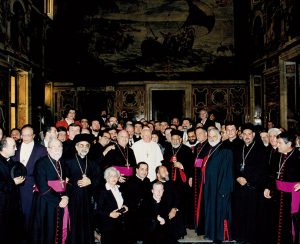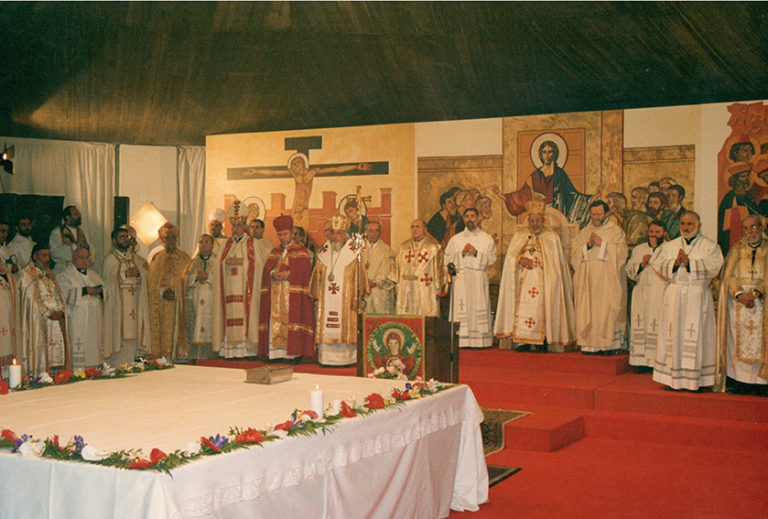Hearing of the Bishops of the Middle East 04-20-1996
S. John Paul II
Vatican City- Clementina Hall, April 20, 1996
John Paul II has received this morning at the Vatican some forty bishops from the Middle East,coming from six churches of different rites.The prelates have met these days in Sabaudia, in the province of Latina, to participate in a retreat promoted by initiators of the Neocatechumenal Way, Kiko Argüello, Carmen Hernández and father Mario Pezzi.The Pope has insisted on the unity of the Christian people “around the pastors of the dioceses and in fraternal dialogue between all believers ”, with“ an increasing solidarity even in the material”. In today’s world where “many people and many towns suffer economic difficulties and suffer poverty and malnutrition,the Church can thus contribute to a better distribution of natural riches and consumer goods. “
Those present at the Audience with the Pope were: His Beatitude Stefanos II, Patriarch of the Copts of Alexandria in Egypt, 36 bishops from the region, numerous priests representing eleven Middle Eastern nations and the initiators of the Neocatechumenal Way. At the end of the Audience, at the microphone of Roberto Piermarini, Patriarch Stefanos II explained the contribution that this ecclesial experience can make in the Eastern Churches:
«It must be said that this experience strengthens us in the faith of our Baptism and, with this Neocatechumenal Way, with this community life we seek to be able to really live, not only as individuals but also as a collectivity. And for this reason, also under the “Latin”, Western liturgical aspect, we can preserve our liturgies, our Eastern rites and preserve this spirit of search, conversion and firmness of our Catholic faith ». But this ecclesial experience, born in Spain in the early 1960s and which already has thirteen thousand communities present in almost 100 nations on the five continents, how can it give a boost to the New Evangelization in the Middle East at the gates of the third millennium?
Kiko Argüello, initiator of the Neocatechumenal Way, has responded as follows:
«It can lead to a path of rebirth, of rediscovery of Baptism, to fortify the Christians from those areas that are in very large difficulties, either in terms of secularization, or for immigration … We have seen that in many parishes it has been important to “water” your Baptism so that faith begins to grow and have consolidated community relations and witnesses in the job. Many parishes have begun to flourish and the parish priests are very happy. I think that the vitality of the Council has wanted to prepare the Church to the challenges of the third millennium, giving her charisms, the strong breath of the Holy Spirit to proclaim Christ, overcomer of death, to everyone and to be able to truly respond to the challenges of the third millennium which are in principle the new anthropology of a world secularized and atheist who denies Revelation. A world that does not recognizedivine fatherhood. Christ has come to show us to the Father and that we are children of God: thus an impressive anthropology indicates us that saves the family. Faced with a culture that is corroding the family principles, the Path through small communities save the family. And of these families that open to life, which are regenerated, thousands of vocations are being born to help the Church.

During the meeting, held at Clementine Hall, the Holy Father made the following address: “1. It is with joy that I welcome you to the house of the Successor of Peter, on the occasion of the special meeting in which you participate. I welcome each one of you, pastors and faithful of the Catholic Churches of the Middle East: May the peace of the risen Lord be with you and with your ecclesial communities! At this time, the sacred liturgy, after Easter and the Resurrection of the Lord, makes us reread the Acts of the Apostles that present the birth and the first development of the Church, of the initial community, met in prayer with Mary (Acts 1.13-14). By the work of the Holy Spirit, “the Lord added to the community every day those who were to be saved” (Acts 2 : 47 Illustrating the path of the disciples, the book of Acts insists on its diligence “to the teaching of the apostles, to fraternal communion, to the breaking of bread and to prayers” (Acts 2:42) and adds that they enjoyed sympathy of all people (see Acts 2.47; 4.33) Today, too, the Church is called to Live this ideal of the first Christians to form together an authentic community of brothers, in the following of Christ. It is important that the unity of the Christian people shine; unity that takes place around the pastors of the dioceses in a fraternal dialogue between all believers. The unity of faith in the distribution of reciprocal gifts spiritually enriches the Church and pushes her to broader solidarity, even in material terms. In today’s world, where many people and many people suffer economic difficulties and suffer poverty and malnutrition, the Church can thus contribute to a better distribution of natural riches and consumer goods. The testimony of faith goes through daily expressions of love that are shared and are in solidarity among men, especially “with the poor who are God’s favorites … our common Father. And we are all brothers of one family” (Gregorio de Nisa , The love for the poor).
2. The witness of unity and charity is indispensable in the Church for the New Evangelization. Faced with the challenges of secularization, to the closure of life by not a few sectors of public opinion, it is very urgent that Christians offer a credible witness to their faith, embodying the Gospel in its existence. Mature and educated believers can well offer those who are searching for the truth adequate answers to your questions. This implies that each ecclesial community is open to welcome and dialogue, respecting cultural diversity and announcing to everyone the only Gospel of salvation.May, dear brothers and sisters, an ever deeper adherence to The risen Christ help you to know how to discern the signs of the times and to walk together according to that synodal spirit that characterizes the structure of your ecclesial communities. The mission of the Christians in the Middle East is big, but at the same time complex and delicate. It is therefore necessary to cultivate mutual respect and nurture constant attention, especially with regard to the ecumenical field and dialogue with the great monotheistic religions.

3.I like, by the way, to recall the recent trip to Tunisia, where I visited the Catholic community that lives in that country, confirming the children of the Church in their adherence to the Gospel. I have exhorted you also to defend and advance spiritual values, morals and sociocultural through dialogue and collaboration with those other religions, to develop fraternal life and solidarity between the inhabitants of the same nation and between all towns (cf. Nostra aetate, 2). This may intensify relationships already existing of friendship and mutual esteem. In this spirit I encourage you to continue your mission, taking care to promote building a society open to understanding and solidarity among all its components.While I invoke on your Communities the maternal protection of Most Holy Mary and of the patron saints, with great affection I impart to you the Apostolic Blessing to you and to all who help you in your ecclesial service ».